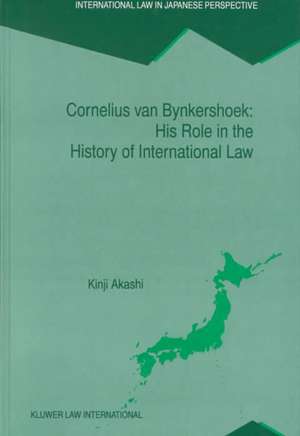Cornelius van Bynkershoek: His Role in the History of International Law: International Law in Japanese Perspective, cartea 4
Autor Kinji Akashien Limba Engleză Hardback – 30 sep 1998
The work comprises three main parts: - the construction of Van Bynkershoek's general theory of the law of nations, - an overview and analysis of the contemporary practice relevant to his theories on the laws of neutral commerce, and - the 'genealogy' of Van Bynkershoek's works, namely his relation to Grotius and to his later generations of publicists. Scholars and others interested in the past and future direction of international law as a whole will not want to miss this highly original offering.
Preț: 956.74 lei
Preț vechi: 1166.75 lei
-18% Nou
Puncte Express: 1435
Preț estimativ în valută:
183.07€ • 199.48$ • 154.26£
183.07€ • 199.48$ • 154.26£
Carte indisponibilă temporar
Doresc să fiu notificat când acest titlu va fi disponibil:
Se trimite...
Preluare comenzi: 021 569.72.76
Specificații
ISBN-13: 9789041105998
ISBN-10: 9041105999
Pagini: 204
Dimensiuni: 155 x 235 x 19 mm
Greutate: 0.48 kg
Editura: Brill
Colecția Brill | Nijhoff
Seria International Law in Japanese Perspective
ISBN-10: 9041105999
Pagini: 204
Dimensiuni: 155 x 235 x 19 mm
Greutate: 0.48 kg
Editura: Brill
Colecția Brill | Nijhoff
Seria International Law in Japanese Perspective
Recenzii
'This book is highly recommended for those seeking a better understanding of the intellectual development of international law and particularly of this notable classicist.'
International Journal of Legal Information, 28:2 (2000).
International Journal of Legal Information, 28:2 (2000).
Cuprins
Introduction: The Purpose of this Study and Some Remarks on Method and Terms. Preliminary Consideration: Bynkershoek's Generally Accepted Position in the History of International Law. Part 1: Theory Per Se: Bynkershoek's Theory of Jus gentium. I. The Definition of Jus gentium. II. The Source of Jus gentium: Bynkershoek's Concept of Usus, Consuetudo and Mores. III. The Source of Jus gentium: Bynkershoek's Concept of `Agreement'. IV. The Subjects of Jus gentium. V. Ratio as Used by Bynkershoek. Part 2: Method: Bynkershoek's Opinion and the Dutch Practice. I. Dutch Policy on Neutral Commerce in the 17th Century: A Review of Bynkershoek's Theory. II. Dutch Policy on Contraband in the 17th Century: Treatment of Naval Stores and Bynkershoek's Theory. Part 3: Genealogy: Bynkershoek's Works in the Stream of Legal Thoughts of the Law of Nations. I. Bynkershoek and Grotius. II. Bynkershoek and Vattel. III. Bynkershoek and Anglo-American Jurisprudence. Conclusion. Bibliography.










